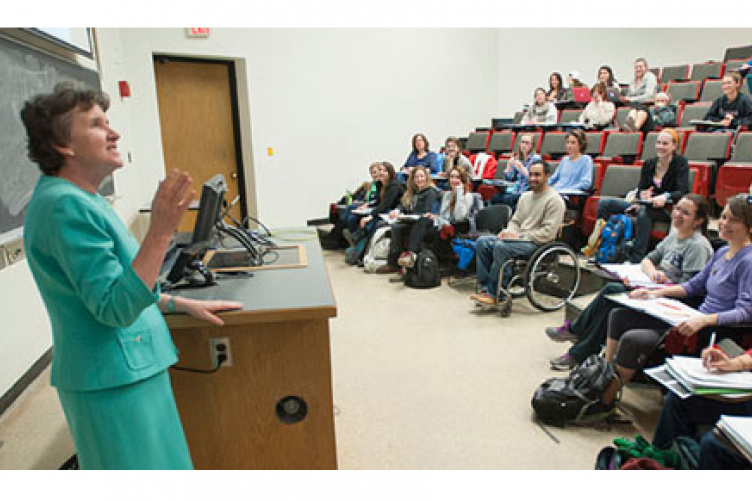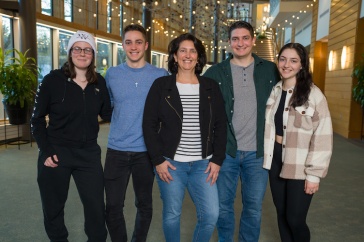
"I believe that in a country that produces so much food all Americans should have access to a healthy diet." --Joanne Burke, director of the Dietetic Internship at UNH
At a time when the United States is fighting an epidemic of obesity, Joanne Burke, the director of the UNH graduate level Dietetic Internship in the College of Life Sciences and Agriculture, is more attuned to a side of the epidemic less dwelled upon than the more sensational elements of our “fast food nation.”
“I have always had an interest in hunger and food security rooted in my commitment to social justice,” says Burke. “I believe that in a country that produces so much food all Americans should have access to a healthy diet.” According to Burke nearly 15 percent of United States citizens report food insecurity. In New Hampshire, the number of people using the Supplemental Nutrition Assistance Program (formerly known as Food Stamps) has doubled in the last ten years.
Burke’s work has made her well-known nationally and earned her the Hunger and Environmental Nutrition Dietetic Practice Group’s prestigious Excellence in Hunger and Environmental Nutrition Award.
Burke maintains that we cannot afford to only treat the symptoms of food insecurity without addressing the upstream causes. “We need to identify meaningful solutions, and build the capacity for social and economic platforms that promote a society where people can earn a livable wage, thrive where they reside, and reach their full potential,” says Burke.
“While some people will always need help, many more U.S. citizens are actively working or seeking employment but unable to meet basic human needs. As fundamental as the civil rights movement of the 60’s, there is a growing realization that persistent societal inequities, be they evidenced as inadequate access to food, water, clothing or shelter, serve to undermine the ability of a society to thrive and survive.”
For Burke, winning the Excellence in Hunger award also serves to bring additional credence to the University’s commitment to sustainability while drawing prospective students interested in this field to the nutrition program. “It’s such a privilege – and a responsibility – to work with students,” says Burke. “The nutrition field is so enriched by other findings: the psychology of eating, metabolic interrupters, a genetic basis for obesity. As a registered dietitian, I am continually learning.” As Burke stays on the cutting-edge, she sees more and more young professionals who were once her students now committed to systems thinking … and hiring her recent dietetic internship graduates.
She is presently participating in a Sustainability Institute regional food system “Vision” project initiative designed to explore the aspirational possibilities for a more sustainable, resilient, and just food system in New England from now through 2060.
“There is much to do,” says Burke. “I am honored to work in a field where I can make a difference, and have always admired the late Robert Kennedy who gave his life in service. As he was known to say, ‘the individual work we do does indeed make a difference, collectively’.”
|
Why is nutrition an important part of sustainability? Read more of Professor Burke Q & A >> Courtesy Photo |
Currently, Burke is working in cooperation with Margaret Sova McCabe, Professor of Law and Associate Dean of Academic Administration and Special Projects at the UNH School of Law – also a faculty fellow in the Sustainability Institute – on a plan to address children’s hunger in a project spearheaded by the New Hampshire Children’s Alliance. “These types of community engagements serve to address the needs of our statewide constituents, and leverage the University’s expertise in helping to address complex problems,” Burke says.
Likewise, the collaborative work through the Sustainability Institute serves to advance state and regional efforts, and demonstrates UNH’s commitment to building a robust, sustainable food system for all.
Burke is an important voice in promoting dietary advice at the national level. Her vision is for guidelines that are not just healthy, but sustainable in long-term food production. “Good nutrition is about a lot more than food and calories,” says Burke whose early training focused on how to stretch the value of a dollar. “Now it’s about thinking bigger – will these methods be sustainable, because it’s healthy land that produces the healthy food that produces healthy people.”
Originally published by:
College of Life Sciences & Agriculture
-
Written By:
Staff writer | Communications and Public Affairs




















































